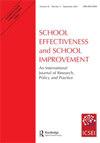检验教育有效性的动态模型:塞尔维亚教师因素对数学和生物学兴趣和成绩的影响
IF 2.8
3区 教育学
Q1 EDUCATION & EDUCATIONAL RESEARCH
引用次数: 5
摘要
考虑到学生成绩和对学科的兴趣是最重要的教育目标,而教学质量是影响这些目标的关键学校因素,我们从教育有效性的动态模型中考察了教师水平变量对学生成绩和对数学和生物的兴趣的贡献。代表性样本包括来自塞尔维亚125所小学的5476名学生和5021名家长。学生和教师变量的数据是通过学生和家长问卷收集的,而以前和现在的成绩数据分别来自学生2011年国际数学与科学研究趋势(TIMSS)的分数和国家考试成绩。数据分析采用多层次建模。结果表明,动态模型中的教师因素不影响学生的数学和生物成绩,但影响学生对这两门学科的兴趣。提出了教育政策建议和进一步研究的方向。本文章由计算机程序翻译,如有差异,请以英文原文为准。
Testing the dynamic model of educational effectiveness: the impact of teacher factors on interest and achievement in mathematics and biology in Serbia
ABSTRACT Having in mind that student achievement and interest in subject are some of the most important educational goals, and that quality of teaching is the crucial schooling factor influencing them, we examined the contribution of teacher-level variables from the dynamic model of educational effectiveness to student achievement and interest in mathematics and biology. The representative sample included 5,476 students from 125 elementary schools in Serbia and 5,021 parents. Data on student and teacher variables were collected through student and parent questionnaires, while data on prior and current achievement were comprised from students’ Trends in International Mathematics and Science Study (TIMSS) 2011 scores and national examination results, respectively. Data were analyzed using multilevel modeling. The results indicate that teacher factors from the dynamic model did not impact student achievement in mathematics and biology but influenced student interest in both subjects. We offer recommendations for educational policy and directions for further research.
求助全文
通过发布文献求助,成功后即可免费获取论文全文。
去求助
来源期刊

School Effectiveness and School Improvement
EDUCATION & EDUCATIONAL RESEARCH-
CiteScore
6.60
自引率
0.00%
发文量
23
期刊介绍:
School Effectiveness and School Improvement presents information on educational effectiveness, practice and policy-making across primary, secondary and higher education. The Editors believe that the educational progress of all students, regardless of family background and economic status, is the key indicator of effectiveness and improvement in schools. The journal strives to explore this idea with manuscripts that cover a range of subjects within the area of educational effectiveness at the classroom, school or system level, including, but not limited to: •Effective pedagogy •Classroom climate •School ethos and leadership •School improvement and reform programmes •Systemwide policy and reform
 求助内容:
求助内容: 应助结果提醒方式:
应助结果提醒方式:


